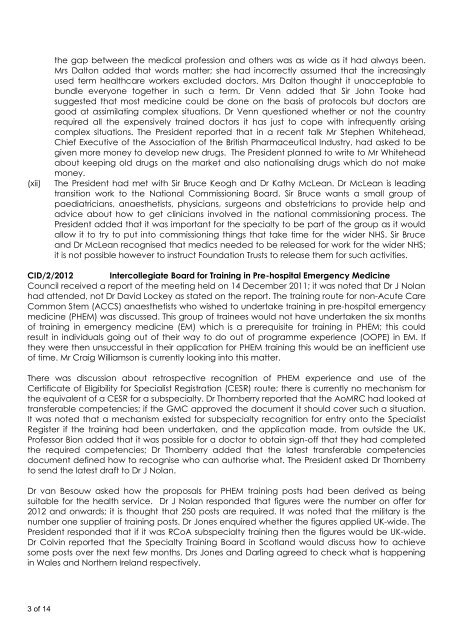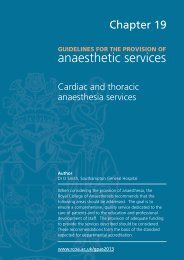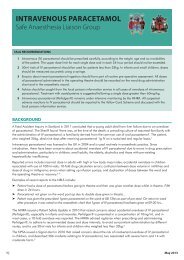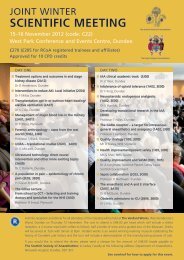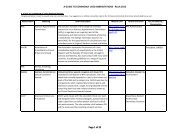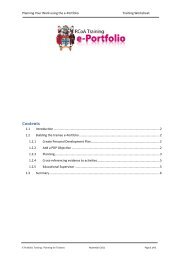January - The Royal College of Anaesthetists
January - The Royal College of Anaesthetists
January - The Royal College of Anaesthetists
You also want an ePaper? Increase the reach of your titles
YUMPU automatically turns print PDFs into web optimized ePapers that Google loves.
the gap between the medical pr<strong>of</strong>ession and others was as wide as it had always been.<br />
Mrs Dalton added that words matter; she had incorrectly assumed that the increasingly<br />
used term healthcare workers excluded doctors. Mrs Dalton thought it unacceptable to<br />
bundle everyone together in such a term. Dr Venn added that Sir John Tooke had<br />
suggested that most medicine could be done on the basis <strong>of</strong> protocols but doctors are<br />
good at assimilating complex situations. Dr Venn questioned whether or not the country<br />
required all the expensively trained doctors it has just to cope with infrequently arising<br />
complex situations. <strong>The</strong> President reported that in a recent talk Mr Stephen Whitehead,<br />
Chief Executive <strong>of</strong> the Association <strong>of</strong> the British Pharmaceutical Industry, had asked to be<br />
given more money to develop new drugs. <strong>The</strong> President planned to write to Mr Whitehead<br />
about keeping old drugs on the market and also nationalising drugs which do not make<br />
money.<br />
(xii) <strong>The</strong> President had met with Sir Bruce Keogh and Dr Kathy McLean. Dr McLean is leading<br />
transition work to the National Commissioning Board. Sir Bruce wants a small group <strong>of</strong><br />
paediatricians, anaesthetists, physicians, surgeons and obstetricians to provide help and<br />
advice about how to get clinicians involved in the national commissioning process. <strong>The</strong><br />
President added that it was important for the specialty to be part <strong>of</strong> the group as it would<br />
allow it to try to put into commissioning things that take time for the wider NHS. Sir Bruce<br />
and Dr McLean recognised that medics needed to be released for work for the wider NHS;<br />
it is not possible however to instruct Foundation Trusts to release them for such activities.<br />
CID/2/2012 Intercollegiate Board for Training in Pre-hospital Emergency Medicine<br />
Council received a report <strong>of</strong> the meeting held on 14 December 2011; it was noted that Dr J Nolan<br />
had attended, not Dr David Lockey as stated on the report. <strong>The</strong> training route for non-Acute Care<br />
Common Stem (ACCS) anaesthetists who wished to undertake training in pre-hospital emergency<br />
medicine (PHEM) was discussed. This group <strong>of</strong> trainees would not have undertaken the six months<br />
<strong>of</strong> training in emergency medicine (EM) which is a prerequisite for training in PHEM; this could<br />
result in individuals going out <strong>of</strong> their way to do out <strong>of</strong> programme experience (OOPE) in EM. If<br />
they were then unsuccessful in their application for PHEM training this would be an inefficient use<br />
<strong>of</strong> time. Mr Craig Williamson is currently looking into this matter.<br />
<strong>The</strong>re was discussion about retrospective recognition <strong>of</strong> PHEM experience and use <strong>of</strong> the<br />
Certificate <strong>of</strong> Eligibility for Specialist Registration (CESR) route; there is currently no mechanism for<br />
the equivalent <strong>of</strong> a CESR for a subspecialty. Dr Thornberry reported that the AoMRC had looked at<br />
transferable competencies; if the GMC approved the document it should cover such a situation.<br />
It was noted that a mechanism existed for subspecialty recognition for entry onto the Specialist<br />
Register if the training had been undertaken, and the application made, from outside the UK.<br />
Pr<strong>of</strong>essor Bion added that it was possible for a doctor to obtain sign-<strong>of</strong>f that they had completed<br />
the required competencies; Dr Thornberry added that the latest transferable competencies<br />
document defined how to recognise who can authorise what. <strong>The</strong> President asked Dr Thornberry<br />
to send the latest draft to Dr J Nolan.<br />
Dr van Besouw asked how the proposals for PHEM training posts had been derived as being<br />
suitable for the health service. Dr J Nolan responded that figures were the number on <strong>of</strong>fer for<br />
2012 and onwards; it is thought that 250 posts are required. It was noted that the military is the<br />
number one supplier <strong>of</strong> training posts. Dr Jones enquired whether the figures applied UK-wide. <strong>The</strong><br />
President responded that if it was RCoA subspecialty training then the figures would be UK-wide.<br />
Dr Colvin reported that the Specialty Training Board in Scotland would discuss how to achieve<br />
some posts over the next few months. Drs Jones and Darling agreed to check what is happening<br />
in Wales and Northern Ireland respectively.<br />
3 <strong>of</strong> 14


